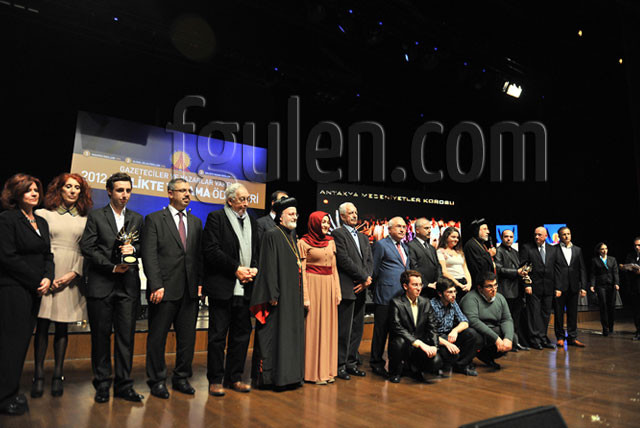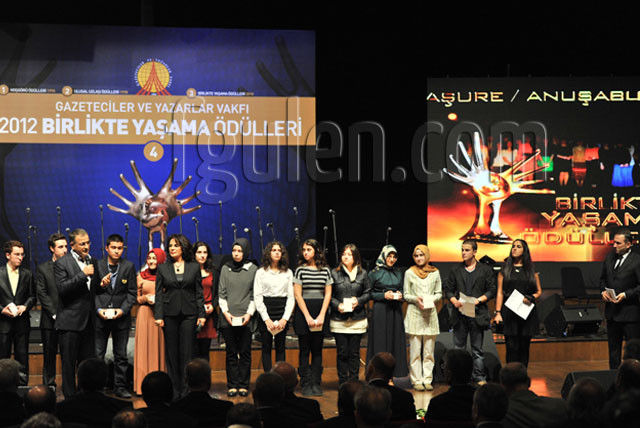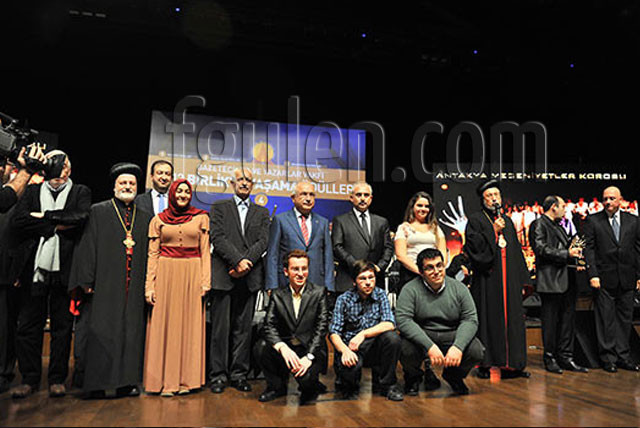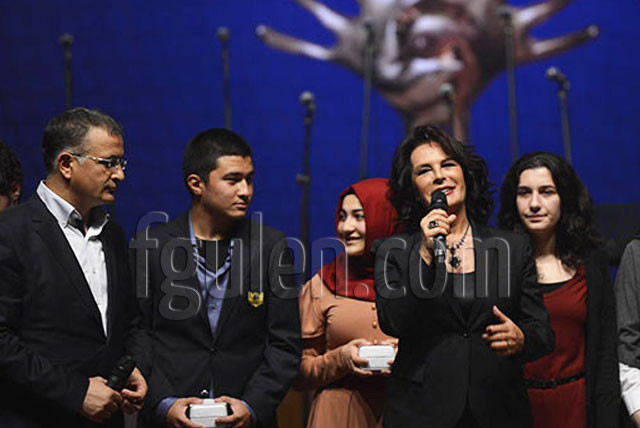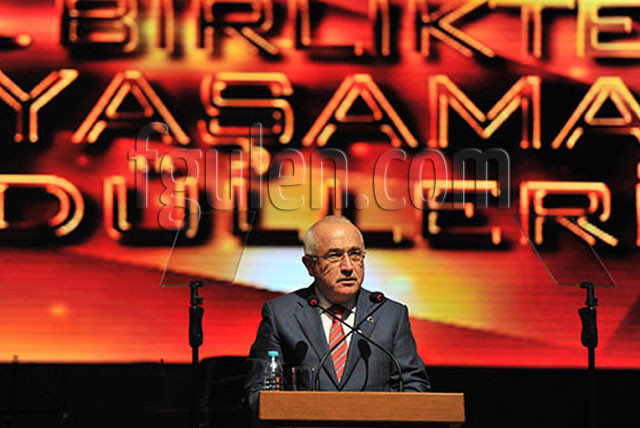GYV honors Turkey's minorities with Coexistence Awards
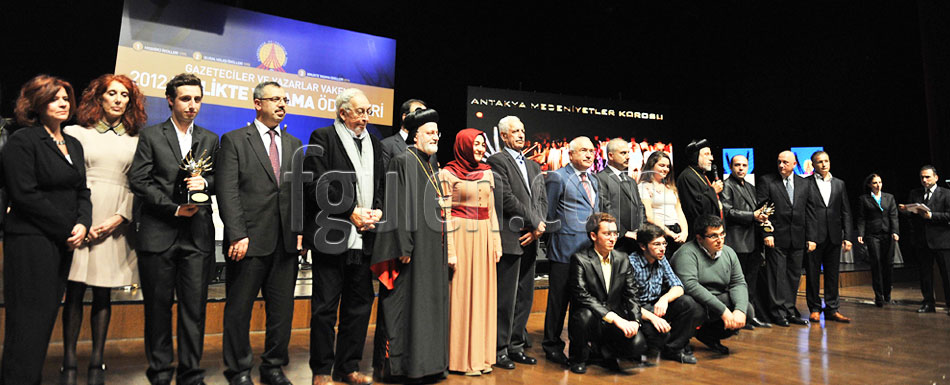
The Journalists and Writers Foundation (GYV) has placed emphasis on honoring Turkey's minority groups and oppressed voices in its 4th Coexistence Awards in the hope of giving a stimulus to those promoting peaceful coexistence with a sustained effort despite scarce resources. The awards ceremony attracted thousands of audience members, including officials, intellectuals and public figures, who on Sunday night at İstanbul's Congress Center expressed their solidarity and approval with a loud standing ovation for awardees not often heard of but recognized for their courageous strides in their bid to mitigate animosity and foster peaceful coexistence.
Notions of peaceful coexistence, GYV Chairman Mustafa Yeşil stressed in his opening speech, were the prevailing theme of the night, where mostly minority groups in Turkey received awards for their outstanding work -- often laden with symbolic significance -- that helps promote the coexistence the Turkish public has been longing for.
Sunday's awards ceremony was the fourth of its kind, the last being presented in 2010 and the first in 1995. The related Twitter hashtag #birlikteyaşamaödülleri was one of the top trending topics of the night. The event was broadcast live by Mehtap TV.
The GYV was founded in 1994, and the mission and work of the foundation is inspired by GYV Honorary President Fethullah Gülen. Gülen, known for his teachings of "hizmet" (service), tolerance and dialogue, has attracted a large number of supporters in Turkey and Central Asia and increasingly in other parts of the world.
The highest-level public official who graced the event with messages of peace and dialogue was Cemil Çiçek, speaker of the Turkish Parliament, who condemned the use of violence to express grievances and pointed to channels of democracy he said were "still open."
"Solitude belongs only to God," Çiçek underlined, adding that people have no ability to choose their race, land, family or culture. The speaker said the most important task assigned to people is to make life more beautiful and that conflict among people over things they didn't choose "makes no sense."
Çiçek blamed lack of love among people as the chief culprit in sowing the seeds of animosity and said people in Turkey do not undertake shared efforts to make each other happy.
Çiçek said it is absolutely necessary for everyone to maintain peaceful relations with others and added that "our shared identity is that we are all human. The rest of the things are just details."
The first award, honoring a renowned professor in the category of Scientific Research, went to Nilüfer Göle. A Paris-based sociology professor, Göle is known for a number of research projects and books on the subject of Islam and Europe. She is currently teaching at L'Ecole des hautes études en sciences sociales (EHESS) in Paris and is the author of several books that have been published in several languages.
İstanbul Governor Hüseyin Avni Mutlu presented the award to Göle, who said one needs to be sensitive to the injustice others are victim of.
The jury that selected Göle and other awardees included the Rabbinate head and honorary leader of the Jewish community Bensiyon Pinto, Roma Associations Federation President Erdinç Çekiç, movie star Hülya Koçyiğit, history professor Mete Tunçay, author Mıgırdıç Margosyan, Yeşil, Türk Ocakları Chairman Nuri Gürgür, Kurdish intellectual and author Orhan Miroğlu, theology professor Ömer Faruk Harman, renowned writer of Alevi origin Reha Çamuroğlu, journalist and writer Taha Akyol and Professor Toktamış Ateş.
The Literature Award, given to Turkey's bestselling author Elif Şafak in 2010, was presented to Hilmi Yavuz -- poet, philosopher and Zaman daily columnist.
The jury decided to present this year's Print Media Award to Armenian weekly Agos -- whose editor-in-chief Hrant Dink was murdered in front of his office in 2007 -- a decision largely driven by a recent lead story in the paper slamming an anti-Islam movie that denigrated the Prophet Muhammad.
The Visual Media Award went to Dünya TV, a TV station based in Gaziantep on the Syrian border, which is also the only private TV channel broadcasting in Kurdish. Çiçek presented the award to the head of the TV channel, which broadcasts Kurdish programs that promote peace and coexistence.
The Exemplary Behavior and/or Initiatives in the Public Sphere Award was presented to students of Mümtaz Turhan Social Sciences School and the Private Getronagan Armenian High School for their outstanding project called "Aşure/Anuşabur." A group of Turkish and Armenian students launched a project to travel across Turkey to meet other cultures and see if they could help foster a more peaceful coexistence between different groups in the country.
The students received the awards from Zaman Editor-in-Chief Ekrem Dumanlı and Koçyiğit. The Zaman executive said youth in the 1980s were subjects of "futile conflicts" and added that those who survived understood that these conflicts are useless.
Turkcell CEO Süreyya Ciliv said his company will award one year of Turkcell credit to the students free of charge.
The Antakya Civilizations Chorus, which contributes to "brotherly coexistence" with their songs, was presented the Visual, Auditory Arts and Stage Arts Award.
The two Social and Cultural Understanding Awards went to Saliba Özmen, the bishop of the nearby city of Mardin, and the chairman of the Veysel Karani Foundation in Batman, 86-year-old Hacı Mirza Demir.
The Special Jury Award went to Monsignor Georges Marovitch, a former Vatican diplomatic representative in Turkey who died this March.
Grand National Unity Party (BBP) leader Mustafa Destici, Governor Mutlu, İstanbul Mayor Kadir Topbaş and Fatih Mayor Mustafa Demir were also among the event's participants.
- Created on .
